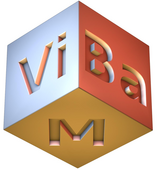The project Viewpoint-Based Modelling (ViBaM) was successfully applied for in the European "EuroStars" program and is funded by the German Federal Ministry of Education and Research (BMBF).
The goal of the ViBaM project is to provide modelling tools supporting viewpoints with a set of predefined “off the shelf” methods, which are specifically tooled viewpoints. The tools must also allow the definition and the tooling of new viewpoints by the end users. Complex systems can always be seen from several different perspectives (viewpoints), and their separation into different views is a powerful means to reduce complexity and master their implementation. The Viewpoint technique appears as a powerful means to address the system’s complexity, and to organize the expertise of participants. The Viewpoint technique provides a means to represent and support each specific focus (using views), and to combine these focuses on models.
The Viewpoint mechanism can provide means to filter models, to organize them, to apply specific consistency rules, to provide dedicated tools (such as generators, checkers, model transformers, etc.) depending on the considered view. Each view represents the perspective of a group of participants involved in system development or analysis. For example Technical system architects, Business Analysts, Software architects, Java programmers, Database designers, Safety engineers, Quality experts and Assessors can be focused on different aspects of the system corresponding to their respective area of interest.
Viewpoints enable organizing in different ways the same model, depending on the use readers want to have: for example, a UML model can be organized using packages into families of elements (e.g. Use Cases, Class models) or (exclusively) into functional or conceptual decomposition (e.g. system administration, statistics, end user application, …). Viewpoints are not limited by the “hierarchical organization constraints”, and allow multiple organization/classification of a system’s model. They are an orthogonal concept to existing model organization concepts and each individual model element may appear in different views. Viewpoints help in managing and mastering the complexity of systems by splitting this complexity into different views specific to each problem or usage family, such as functional issues, distribution issues, persistence issues, security issues, safety issues etc., and by allowing multiple classifications and structuring of its elements.
ViBaM will gather three relevant entities in the Modelling community: SOFTEAM and ikv, European SMEs; and DFKI, a Research center. During the next two years, the partners will work together, sharing all their knowhow in order to develop this Viewpoint based Modelling toolset. The work on ViBaM started 1.2.2011 and will continue till 31.1.2013.
At DFKI the work will be performed jointly by the Multiagent System (MAS) Group in the Department of Agents and Simulated Reality (ASR) and the Institute for Information Systems (IWi).
Contact persons in the involved research groups are Dr. Klaus Fischer (MAS/ASR) and Julian Krumeich (IWi).
Partners
Softeam (France), ikv (Germany)


